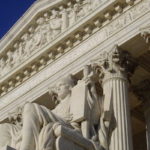Published November 19, 2013
(The four posts below were published on NRO’s Bench Memos blog on November 13, 15, 18, and 19.)
Judge Sykes Versus Judge Rovner on the HHS Mandate—Part 1
Last week’s Seventh Circuit ruling in the consolidated cases of Korte v. Sebeliusand Grote v. Sebelius contains two competing comprehensive opinions on whether the HHS mandate violates the plaintiffs’ rights under the federal Religious Freedom Restoration Act. In a series of posts that address the key points of division, I’m going to present and discuss Judge Diane Sykes’s majority opinion (in favor of plaintiffs) and Judge Ilana Rovner’s dissent.
Let’s start with the questions whether each plaintiff corporation (1) is a personunder RFRA, and (2) is engaged in an exercise of religion when it refuses to provide health insurance that covers contraceptives.
Judge Sykes observes that RFRA itself doesn’t define person and that the Dictionary Act’s definition of the term—which includes corporations “unless the context indicates otherwise”—therefore applies. Because even the Obama administration concedes that some corporations (i.e., religious corporations) have rights under RFRA, it’s clear that corporations aren’t categorically excluded from RFRA. Therefore, the general Dictionary Act definition of person as including corporations governs. (Pp. 36-38.) There is no statutory basis for defining the term to include only those corporations that are religiously affiliated nonprofit corporations. (Pp. 38-46.)
Further, continues Sykes, “unless there is something disabling about mixing profit-seeking and religious practice, it follows that a faith-based, for-profit corporation can claim free-exercise protection to the extent that an aspect of its conduct is religiously motivated.” (P. 47.) But there is nothing disabling about such a mix, as it’s clear that individuals have free-exercise rights when engaged in commercial or profit-making activity. (Pp 47-51.) “On the government’s understanding of religious liberty, a Jewish restaurant operating for profit could be denied the right to observe Kosher dietary restrictions. That cannot be right.” (P. 51.)
Sykes emphasizes that, unlike large publicly traded corporations, the two plaintiff companies “are both closely held and managed by the families that own them,” so that the families “are in a position to operate their businesses in a manner that conforms to their religious commitments.” (P. 54 n. 17.)
In her dissent, Judge Rovner concedes that a corporation is a person under RFRA (p. 86) but argues that it is not possible for a corporation (or, indeed, any organization, whether or not incorporated) to exercise religion. In an extended frolic-and-detour, she contends that religion is an “intensely personal experience” (p. 86), a “matter of personal conscience” (p. 90), but she never seems to grasp that individuals (like the members of the Korte and Grote families) can and do associate together in corporations and other organizations in order to live out their faith in the world.
Rovner can’t even bring herself to embrace the concept that religious organizations can exercise religion. She instead thinks that the established precedent “[p]ermitting a religious organization, incorporated or not, to invoke the Free Exercise Clause makes sense [only] as a matter of pragmatism,” as a “religious association is often as well if not better situated as the individuals who make up the association to assert the relevant religious interests.” (P. 81; see also p. 83 (“question[ing] whether [a religious organization] has free exercise rights of its own”.)
Rovner’s long footnote (pp. 96-97 n. 5) responding to Sykes’s hypothetical of a Jewish restaurant being denied the right to keep kosher is especially telling. (I confess I’m confused whether she is assuming throughout the footnote that the restaurant is an incorporated business. If she is, her “First” response elides the distinction between a corporation and its owners, the same distinction that she elsewhere maintains is so inviolate.) In Rovner’s view, an incorporated restaurant, owned and operated by a Jewish family abiding by its religious beliefs, would have no free-exercise right of its own to assert. At most, it “might have third-party standing to assert the free exercise rights of its customers.”
Judge Sykes Versus Judge Rovner on the HHS Mandate—Part 2
Now let’s turn to the next question under RFRA: whether the HHS mandatesubstantially burdens plaintiffs’ refusal, on religious grounds, to provide health insurance that covers contraceptives (including drugs that sometimes operate as abortifacients) and sterilization.
In her majority opinion, Judge Sykes soundly reasons that the substantial-burden inquiry is straightforward. (Pp. 54-60.) Each company is under a legal obligation to comply with the mandate, and the individual family members who set company policy are obligated to ensure that the company complies. “Refusing to comply means ruinous fines”—$100 per day per employee—“essentially forcing the Kortes and Grotes to choose between saving their companies and following the moral teachings of their faith.” (P. 57.) Compare that (as I discuss in part II of my law-review essay on the HHS mandate and RFRA) with the single fine of $5 that constituted a substantial burden in the landmark Free Exercise ruling in Wisconsin v. Yoder (1972).
Sykes deftly disposes of the government’s badly confused argument that the HHS mandate’s burden on the plaintiffs’ religious exercise is insubstantial because (as she summarizes the argument) “the provision of contraception coverage is several steps removed from an employee’s independent decision to use contraception.” (P. 57.) As she nicely puts it (p. 59):
[I]t goes without saying that [plaintiffs] may neither inquire about nor interfere with the private choices of their employees on [contraception, abortifacient drugs, and sterilization]. They can and do, however, object to being forced to provide insurance coverage for these drugs and services in violation of their faith.
It’s that coerced coverage that infringes their religious rights. Under elementary principles of religious freedom, it is simply no business of a court to impose on religious believers the court’s own view of the range of permissible religious beliefs about what constitutes improper complicity in immoral conduct.
In her dissent, Judge Rovner spends some 36 pages (pp. 102-138) winding her way to the conclusion that the HHS mandate does not substantially burden the individual plaintiffs’ exercise of religion. (She doesn’t need to address the burden on the company plaintiffs here, as she has already (wrongly) knocked them out. See Part 1.) Despite recognizing that the Supreme Court has “rejected the directness or indirectness of the burden as a controlling factor in free exercise cases” (p. 114), Rovner somehow proceeds to make directness an essential component of a substantial burden: “A substantial burden is one that bears direct, primary, and fundamental responsibility for making the plaintiff’s religious exercise impracticable.” (P. 121 (emphasis added).)
Applying this misunderstanding, Rovner offers “two key reasons” why the HHS mandate “poses no direct burden on the Kortes’ and Grotes’ exercise of religion.” (P. 121 (emphasis added).) First, second-guessing the individual plaintiffs’ own understanding of their religious commitments and ignoring their role in managing their companies, she contends that the HHS mandate does not require them “to do anything that violates the Catholic Church’s disapproval of contraception.” (P. 122.) “[W]hat they are really objecting to,” she brazenly claims, “is the private choices that employees and their families might make in reliance on health care coverage that includes contraceptive care.” (P. 126.) No: What they are objecting to, as Sykes spells out in the majority opinion, is “being forced to provide insurance coverage for [contraceptive] drugs and services in violation of their faith.” As Sykes properly recognizes, “the judicial duty to decide substantial-burden questions under RFRA does not permit the court to resolve religious questions or decide whether the claimant’s understanding of his faith is mistaken.” Rovner fails to confine her inquiry to its proper realm.
The second of Rovner’s “key reasons” is that it is the companies, not the individual plaintiffs, against whom the HHS mandate directly applies. But that reason depends entirely on Rovner’s mistaken understanding that a burden must be direct in order to be substantial. Rovner thus ignores the undisputed reality that, as Sykes sums it up (p. 54 n. 17; see also pp. 11-15), “the Kortes and the Grotes as controlling shareholders and directors set all company policy and personally direct the activities of their corporations.” In the special context of these closely held family-owned companies, any distinction between direct burdens on the companies and indirect burdens on the individual plaintiffs is especially flimsy.
Judge Sykes Versus Judge Rovner on the HHS Mandate—Part 3
The last big question under RFRA is whether a substantial burden on a person’s exercise of religion can survive strict scrutiny. More precisely, RFRA provides:
Government may substantially burden a person’s exercise of religion only if it demonstrates that application of the burden to the person—
(1) is in furtherance of a compelling governmental interest; and
(2) is the least restrictive means of furthering that compelling governmental interest.
From their majority and dissenting opinions in the Seventh Circuit’s recent ruling, let’s compare Judge Sykes’s treatment of the question whether the HHS mandate can satisfy both parts of this test with Judge Rovner’s very different treatment.
On the first element—whether the government can demonstrate that applying the HHS mandate against the plaintiffs “is in furtherance of a compelling governmental interest”—Sykes correctly observes that the Supreme Court’s unanimous opinion inGonzales v. O Centro Espirita “has instructed us to look beyond ‘broadly formulated interests justifying the general applicability of government mandates’ and ‘scrutinize[] the asserted harm of granting specific exemptions to particular religious claimants.” (P. 60 (quoting O Centro Espirita).) As Sykes explains, the two public interests that the government advances—“public health” and “gender equality”—are stated “at such a high level of generality” that it is “impossible to show that the mandate is the least restrictive means of furthering them”: “There are many ways to promote public health and gender equality, almost all of them less burdensome on religious liberty.” (Pp. 61-62.) The supposedly compelling governmental interest therefore needs to be defined far more specifically than the government attempted to do.
Sykes soundly recognizes that the least-restrictive-means inquiry is simple. Assuming for the sake of argument that the government’s interest in broadening access to free contraception and sterilization is compelling, she observes that “the government has not even tried to satisfy the least-restrictive-means component of strict scrutiny, perhaps because it is nearly impossible to do so here.” (P. 62.) As she points out, there are many means of increasing access to free contraception—e.g., a public option for contraception insurance, tax incentives for contraceptive suppliers or consumers—that don’t involve dragooning religious objectors. (Pp. 63.) (Indeed, it would seem that the Obama administration has selected the means that ismost restrictive of religious liberty.)
In the eight pages (pp. 138-146) that her dissent spends on the “compelling governmental interest” element, Rovner manages to completely ignore O Centro Espirita. Without even acknowledging the Supreme Court’s rejection of “broadly formulated interests,” much less trying to reconcile her position with the Court’s, she accepts “preventive health care” and “gender equality” as the compelling governmental interests at issue. (P. 141.)
Rovner’s remarkable response to Sykes on the least-restrictive-means inquiry is to assert that “I have my doubts about the feasibility of creating, let alone enacting,” alternative means of increasing access to contraception, “given that it has taken more than 60 years to enact a health insurance reform effort on the scale of the Affordable Care Act, and given the controversies that inevitably surround the reproductive rights of women.” (Pp. 146-147.) I hadn’t realized that a judge’s subjective “doubts” could satisfy strict scrutiny. But let’s move past that to the larger problem: Since when is the political convenience of adopting methods that violate religious liberty an argument in favor of those methods? How can that thinking possibly be reconciled with RFRA?
Rovner’s entire approach, she again confirms, is deeply hostile to RFRA. She asserts that the HHS mandate cannot be considered in isolation, and that the “relevant question … is not whether the government feasibly may ensure access to contraceptive care through other means, but whether it may feasibly ensure access to all types of care to which employers might object on religious grounds.” (P. 148.) Her statement of the “relevant question” is flatly inconsistent with what the Court inO Centro Espirita recognized as the “more focused inquiry required by RFRA and the compelling interest test.”
Judge Sykes Versus Judge Rovner on the HHS Mandate—Part 4
As I have discussed in my previous posts, Judge Sykes’s majority opinion in Korte v. Sebelius straightforwardly applies Supreme Court precedent to hold that the federal Religious Freedom Restoration Act entitles plaintiffs to preliminary injunctive relief against the HHS mandate. In her dissent, by contrast, Judge Rovner repeatedly departs from and defies Supreme Court precedent.
In the first part of her dissent (pp. 68-77), Rovner presents several elaborate hypotheticals that she says “illustrate the uncertainty” that the majority’s application of RFRA “brings to a number of statutory schemes.” But the certain damage that Rovner’s dissent would inflict on basic principles of religious liberty is far more real than anything in her hypotheticals. To sum up:
1. In order to deny the limited proposition that a closely held, family-owned corporation can exercise religion, Rovner goes so far as to contest the established principle, reiterated by the Supreme Court in 2012 in its unanimous decision inHosanna-Tabor Evangelical Lutheran Church v. EEOC, that a “religious organization” (whether or not incorporated) “has free exercise rights of its own.” (P. 83.) Under her approach, a religious organization would have only “associational standing to represent the free exercise rights of its members.” (P. 82.) And since she misconceives of religious exercise solely as “an intensely individual experience” (p. 86)—rather than as something that individuals routinely carry out in association with others, including through organizations—she would construe those individual free-exercise rights very narrowly.
(The Obama administration, which doesn’t embrace Rovner’s extreme position on religious organizations, faces a different problem. A nonprofit “religious organization” can operate the same sort of “secular” businesses that a for-profit corporation can operate. The Obama administration can’t explain how it is that a nonprofit religious corporation can exercise religion when it operates a business but that a closely held family corporation operated in accordance with the family’s religious commitments can’t exercise religion when it does the very same thing.)
2. The stark consequences of Rovner’s position for religious liberty are evident in her view that an incorporated Jewish deli, owned and operated as a for-profit business by a Jewish family abiding by its religious beliefs, would have no free-exercise right to assert against a law requiring that it sell pork.
3. In contravention of Supreme Court precedent, Rovner would hold that a burden on a person’s religious exercise is not substantial under RFRA unless it is imposed directly on that person. She would thus invite and allow legislators and regulators to resort to strongly coercive means so long as they coerce “indirectly.”
4. Again in violation of Supreme Court precedent, Rovner’s approach reflects the position that courts have the authority to reconceive a person’s understanding of his own religious commitments and to impose their own view of the range of permissible belief about what constitutes improper complicity in immoral conduct.
5. Despite acknowledging in the context of her hypotheticals that strict scrutiny is “one of the most demanding standards known in our legal system” (p. 77), Rovner would eviscerate RFRA’s standard of strict scrutiny. She ignores the Supreme Court’s directive that the government’s compelling interest can’t be “broadly formulated.” And she substitutes empty speculation for the government’s burden to show that it is using the means that is least restrictive of religious liberty.
Edward Whelan is president of the Ethics and Public Policy Center and is a regular contributor to NRO’s Bench Memos blog.








